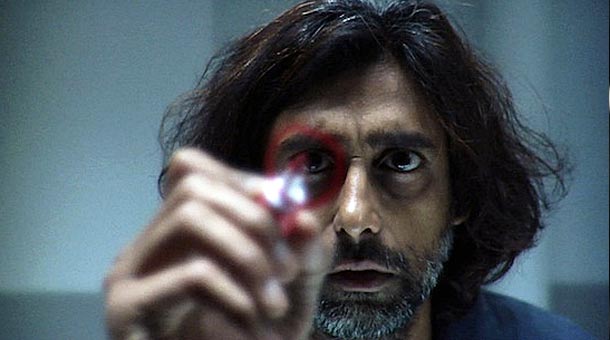
It’s one of the more ambitious debuts to come out of Canada in a while. A film that’s hard to compare to anything else.

It’s one of the more ambitious debuts to come out of Canada in a while. A film that’s hard to compare to anything else.
You Are Here opens with a professor (R.D. Reid) lecturing to an unseen audience while footage of waves rolling in play behind him. He tells the audience to stare at the waves and think for a minute before asking them how they’re looking at the waves. He pulls out a laser pointer and moves the red dot around the screen, asking if they’re focusing on one wave or looking at the whole image. Or are they looking at the red dot? He tells them not to because “this red dot is your enemy.” The professor explains that the red dot is a guide, and the only way for someone to get to their destination is to follow the guide without looking at it. The camera cuts to a shot of just the screen with the red dot bouncing around. Do you take the professor’s advice?
Daniel Cockburn’s film spends its time pondering about identity and how people find their place in the world. There aren’t any answers to the questions You Are Here brings up, but expecting some sort of solution would be missing the point entirely. The film feels like a series of indirectly connected shorts more than a feature with a new story popping up every ten minutes.

After the opening the focus shifts to “Alan,” a man who changes into a different person every several seconds. Other stories include office workers who spend their days telling field agents where to go, a man who spends decades trying to make people see the way he does, a doctor who finds a way to learn a language without understanding it and a woman trying to find a door leading to nowhere in an apartment building.
Cockburn’s decision to split his film into vignettes is a smart one as he can easily present his ideas in a way that separates them instead of throwing them together and overwhelming viewers. Each segment is compelling in its own right, with the most fascinating segment belonging to an archivist (the late Tracy Wright in one of her last roles) who spends her days cataloguing and storing abandoned items she finds in the street.
Eventually the archive appears to be sorting itself as items start moving around. The archivist isn’t sure if she’s doing this unknowingly or if the archive has become self-sufficient, and if the latter if true then she no longer has a purpose in the system she created. Wright’s performance is another sign of how underappreciated she was as an actress. In a film where every character has no real identity, Wright becomes the emotional core. In a later scene where the archivist talks with one of the field agents from a previous story (it’s also the first time we see the archivist having an interaction with another person) it’s surprising to realize how much emotional investment has gone into Wright’s character.
The ending stumbles a bit with the way it forcefully ties the segments together, but You Are Here is brimming with so many ideas that it makes up for its issues with the execution. It’s one of the more ambitious debuts to come out of Canada in a while, a film that’s hard to compare to anything else but covers themes that should hit close to home for everyone. A thought-provoking experience, and hopefully just the beginning of Daniel Cockburn’s career in filmmaking.